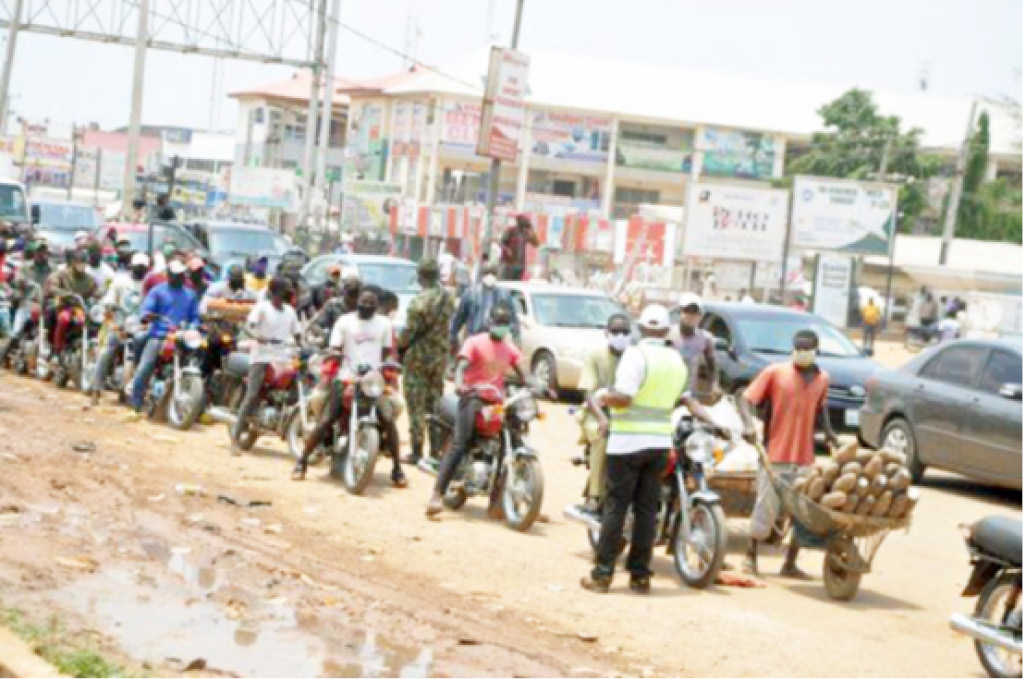Coronavirus shapes what you do, but you shape the pandemic
On the edge of Nyanya, an invisible line separates Nigeria’s capital Abuja from the neighbouring Nasarawa state. Human traffic flows in both directions. A health worker aims a thermal reader at each person’s head to get a readout of their temperature. It is the routine for crossing the boundary. The two women approach from Abuja. […]

On the edge of Nyanya, an invisible line separates Nigeria’s capital Abuja from the neighbouring Nasarawa state.
Human traffic flows in both directions. A health worker aims a thermal reader at each person’s head to get a readout of their temperature. It is the routine for crossing the boundary.
The two women approach from Abuja. One stops in front of the health worker, the other sidesteps both.
Her refusal is aggressive, followed by muttered complaints in pidgin that she didn’t have the time and couldn’t be bothered. All the while walking away.
“Officer, look at her!” the health worker called for the attention of security officers seated under a marque.
One boomed immediately, “Hey, come here. Who do you think you? Get back there!”
Reluctantly the girl had her temperature readout and proceeded in seconds.
Coronavirus has pissed off the world, and it is the disruptions to daily routines that mostly has Nigerians worried.
It is such a bother, many wish it never happened. And their worry is skewing their view of the virus.
As the world raced to understand the novel [read: new] virus from December, other researchers dashed to explore the knowledge, attitudes and perceptions (KAP) to it.
A flurry of KAP studies in Nigeria have emerged since December. One published in MedRXIV analysed the response of 1,357 Nigerians in April, from 180 locations as to what they knew to be the source of the virus.
It found nearly 46 in 100 Nigerians believed the virus to be a “biological weapon designed by the government of China”, compared to 41% who named it a severe illness transmitted from wild animals.
The authors attribute the response to evidence of diverse sources of information concerning the virus that is available to Nigerians.
“What this means is that there may currently be no consensus among Nigerians as to what the real source of the virus is,” they wrote.
Nearly 95 in 100 rightly responded the virus could be transmitted in airborne droplets via breathing, sneezing or coughing.
Before this analysis in April, the virus had already entered Nigeria—and messaging about prevention had already rent the air.
So, when asked about symptoms, 81 in 100 Nigerians named cough, closely followed by shortness of breath, sneezing, fever, sore throat.
But nearly 2% still “did not know”.
“I don’t know, and I don’t care to know” was how Margaret Mfong, a restauranteur at Nyanya described it. Her restaurant and mini is her daily wage earner.
She dashes to market even before 7am to rustle up food items, returns to her shop in an hour. By 11am, she’s prepared portions of semovita, fufu, eba and amala—along with average-sized pots each of afang, egusi okra and white soup. Then she’s set for the day.
In the days leading up to the lockdown and days following the gradual easing, she’s never worn a face mask on her trips to the market.
The outbreak is a pandemic—and reactions to it are not the preserve of Nigerians.
Another study in March surveyed respondents from Nigeria, Kenya and South Africa.
At least 94 in 100 people of sub-Saharan Africa are aware of the outbreak. But on a scale of five, with five been “very concerned”, South Africans were two points more concerned than Nigerians, with Kenya right in the middle.
Awareness came with suspicion about the infection numbers that rose steadily with more testing. And then came a flurry of conspiracy theories about treatment and vaccine, patient identity, and mortality figures.
Confidence in government handling of the outbreak also varied by country. On a scale of five, Nigerians were more concerned about government handling coronavirus pandemic. It placed them one point more concerned than South Africans, and five above Kenyans.
Turnaround is fair play. In the first week after the lockdown was eased off, public health officials were dismayed at how many flouted regulations meant to keep the virus at bay—and threatened another lockdown was imminent if the public didn’t shape up.
Mfong’s response to the broadcast of the Presidential Task Force on Covid:19? “That’s for them. Whether it is coro or Gloria, I don’t even know the name, and I don’t want to know.”
On the morning of Thursday this week, she did her quick dash to the market to prepare for the day’s business. She wore a face mask.
